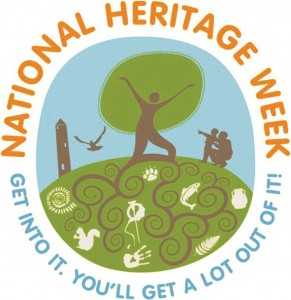
This year’s National Heritage Week takes place between Saturday 17th and Sunday 25th of August.
The week, which sees events celebrating Ireland’s heritage taking place nationwide, is part of European Heritage Days, an EU-wide initiative which began in France in 1984. Throughout the 80s, more and more countries got on board, with Ireland joining in 1989.
Since 2005, responsibility for co-ordinating Ireland’s Heritage Week has been handled by the Heritage Council. Isabell Smyth, Head of Education and Communications at the Heritage Council, tells NewsFour that in Ireland, Heritage Week has become much more of a community-driven event than in other countries. This is partly by necessity, as the Heritage Council has seen their budget slashed by 70% in recent years.
“Originally it was only Office of Public Works sites which were involved,” Smyth says, “Now we have everyone from academics to local historians and small Non-Governmental Organisations, including many environmental NGOs like An Taisce and the Irish Whale and Dolphin Group.”
In order for institutions to qualify, they’re required to make events as free of charge as possible, as the aim of Heritage Week is to get the public involved in thinking about their heritage. “We’re open to most events except those that are not doing something special for the week or aren’t specifically heritage-related,” Smyth says, “mostly we’re open to encouraging all kinds of events and often it’s community groups that get together and arrange speakers to give talks on various aspects of local history. It gives a platform to people with knowledge of, a concern for, and an interest in heritage.”
Last year saw over 1,600 events held across the country and Smyth expects an extra 150 this year. “In the past five years it’s really taken off in the public imagination,” she says, “people appear to have an increased interest in being involved with their local community and Heritage Week is a great opportunity for people to experience something they mightn’t normally have access to.”
Some of the biggest attractions during the week involve those institutions that wouldn’t be otherwise open to the public, such as the Royal College of Physicians, who host a display of antique medical instruments. Smaller local institutions provide the majority of events, however. “It’s important to remember we have wonderful resources like our libraries, the Office of Public Works, parks etc,” Smyth says, “there are lots of cultural resources based in Dublin and most of them are doing something during the week.”
Many events are specifically aimed at teaching children about their heritage, with one of the most popular being a specially tailored children’s tour of the Oireachtas.
Several intriguing events are scheduled for the Dublin 4 area across several venues. Ringsend Library will host talks from experts on local history. The National Print Museum are providing a tour of Beggar’s Bush Barracks as well as hosting a special children’s day. Other scheduled local events include a rare artefact-handling tour of UCD’s classical museum and a talk on the philanthropist Andrew Carnegie in Pembroke Library.
A fully updated schedule can be found on www.heritageweek.ie with a smart-phone app also available. Smyth advises booking in advance, as many events have limited space and can book out quickly.
By Eric Hillis

